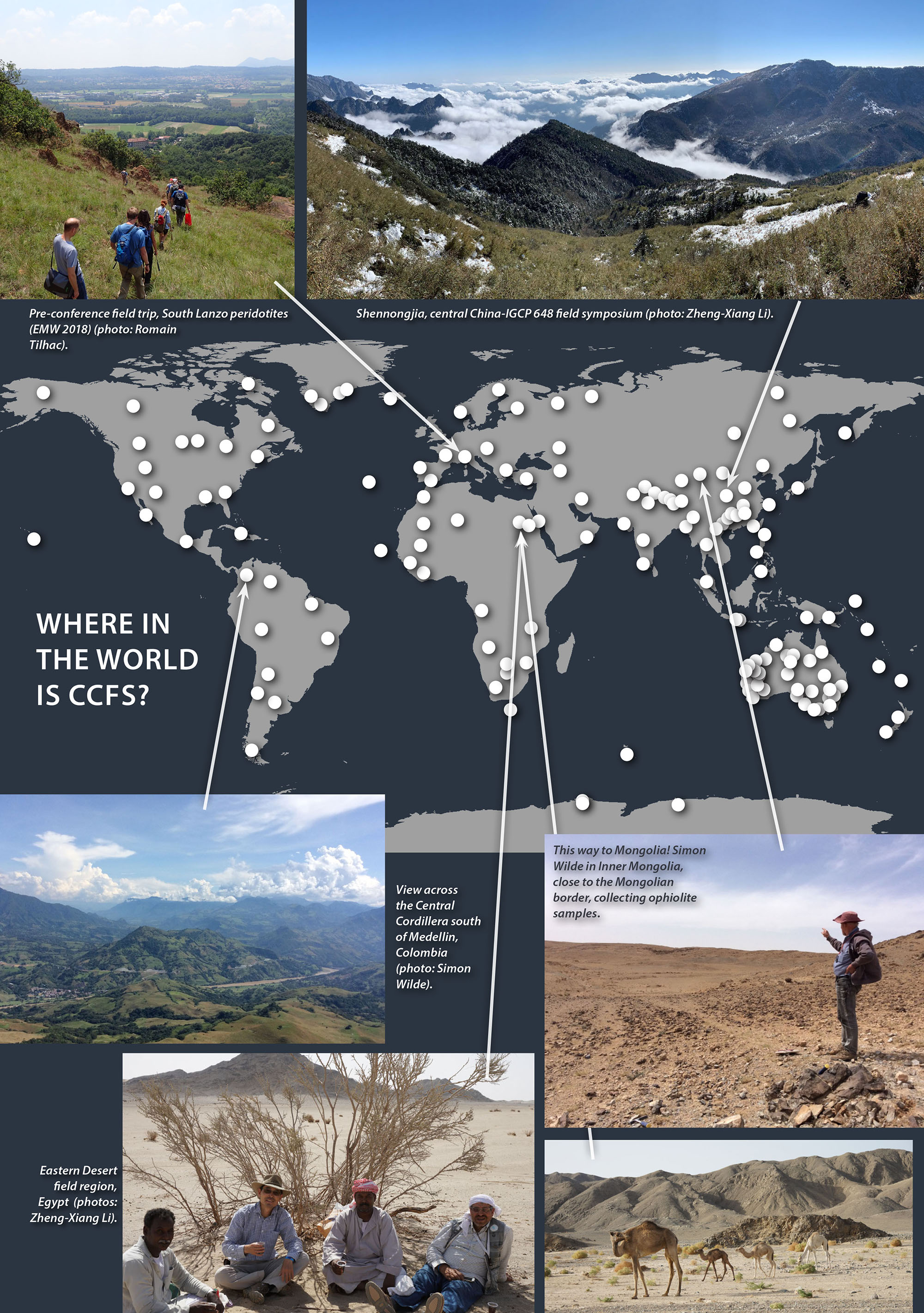The CCFS research program
The CCFS CoE builds on world-class infrastructure and world-leading research expertise and track record, and has already multiplied the capabilities of the Collaborating and Partner Institutions. The research program aims to enhance existing strengths in geology, geochemistry, geophysics, experimental petrology and petrophysical/dynamic modelling, and to integrate knowledge and datasets from these disparate fields.
Major Research Objectives
|
These objectives are being addressed through the Research Programs described below.
The scope of the research, and thus of the Research Programs, are determined by the funding base allocated by ARC with strategic leverage planned to expand available resources.
FOUNDATION RESEARCH PROGRAMS
The original Foundation Programs for 2011-2014 were funded from the ARC Centre funds allocation, and included components from the Universities’ funding support. Programs were chosen from formal applications by CCFS participants based on presentations and discussions at a 2-day meeting in October 2010, ratified by the Executive Committee, and accepted on report to the Advisory Board. The Programs were designed to be interdisciplinary, cross-nodal and to foster early-career/postgraduate researcher's participation. Research directions were designed to contribute to the overarching three major Themes identified to bring about a new level of understanding of Earth and its resource dispersion. They included three integrated projects targeted at Technology Development.
In 2014 the Flagship Programs were restructured to identify the most productive research directions relevant to fulfilling the CCFS vision of “Delivering the fundamental science needed to sustain Australia ’s resource base.” All the research programs were scrutinised, reassessed and realigned (following advice from the Science Advisory Committee).
This resulted in seven Flagship Programs based on the benchmark outcomes of the first 3 years and extending in new directions; programs that had come to fruition in the first three years were finalised. These Flagship Programs target the research goals through to 2018, providing a new focus and realigned strategies to deliver more transformational outcomes and leave a legacy in knowledge, new technology and methodologies, and vital new knowledge about Australia's geological evolution to guide smart new mineral exploration. They are underpinned by two Technology Development Programs designed to deliver more leading-edge geochemical breakthroughs, capitalising on the outstanding geochemical instrumental infrastructure across CCFS.
|
Summaries and progress are detailed in Appendix 1 |
Flagship Programs
| Program / Theme / Framework | Coordinator and main Centre personnel |
|
1. Deep Earth fluids in collision zones and cratonic roots (TARDIS II) Themes 1, 2, 3 Earth's Architecture and Fluid Fluxes |
O’Reilly, Griffin, Kilburn, Martin, Alard, Shafaii Moghadam, Huang, Gréau, Lu
Giuliani, Castillo-Oliver, Tilhac (ECRs) Henry, Liptai, Chasse (PhD/ECRs) Greene (PhD) |
|
2. Genesis, transfer and focus of fluids and metals Themes 2 and 3 Fluid Fluxes |
Fiorentini, McCuaig, Foley, O’Reilly, Griffin, Reddy, Rushmer, Lu, Bagas, Kilburn, Loucks, Clarke
Fougerouse, Gonzalez, Hammerli, LaFlamme, Parra-Avila (ECRs) Bennett, Dering, Jara, Lampinen, Poole (PhDs) |
|
3. Modelling fluid and melt flow in mantle and crust Themes 2 and 3 Earth's Architecture and Fluid Fluxes |
O’Neill, Afonso, Yang, Li, Foley, Clark, S. Zhang, Smith, O’Reilly, Griffin
Jiang, Oliveira Bravo (ECRs) Förster, Lanati, Manassero, Pinter, Wasilev, Wang, Wu, Zhang (PhDs) |
|
4. Atmospheric, environmental and biological evolution Theme 1 Earth's Architecture and Fluid Fluxes
|
Van Kranendonk, Fiorentini, Foley, Kirkland, Kilburn, Alard
LaFlamme, Baumgartner (ECRs) Barlow, Caruso, Djokic, Nomchong, Soares, Teece (PhDs) Tadbiri (MPhil) |
|
5. Australia’s Proterozoic record in a global context Themes 2 and 3 Earth's Architecture |
Li, Pisarevsky, Wang, Wingate, O’Reilly, Griffin, Belousova, McCuaig, Mitchell
Kirsher, Yao (ECRs) Stark, Y. Liu, Martin, Nordsvan, Volante (PhDs) |
|
6. Fluid regimes and composition of early Earth Themes 1 and 3 Earth's Architecture and Fluid Fluxes |
Wilde, Nemchin, Grange, Martin, O'Neill
Ge (ECR) Liu, K (PhD) |
|
7. Precambrian architecture and crustal evolution in WA Themes1,2 and 3 Earth's Architecture |
Gessner, Kirkland, Belousova, Gréau, Yuan, Wingate, Tyler, Lu
Wu (ECR) Derring (PhD) |
Technology Development |
|
|
Cameca Ion microprobe Themes 1, 2, 3 Earth's Architecture and Fluid Fluxes |
Kilburn, Martin, Jeon, Fiorentini, McCuaig, Griffin, LaFlamme, Reddy
Students of CIs and ECRs utilising the Ion Probe Facility are active in the program |
|
GAU multi-instrument development Themes 1, 2, 3 Earth's Architecture and Fluid Fluxes |
Alard, Griffin, O’Reilly, Gréau, Kilburn, Martin, Huang
Henry, Liptai (PhD/ECRs) |


 ARC Centre of Excellence for Core to Crust Fluid Systems
ARC Centre of Excellence for Core to Crust Fluid Systems